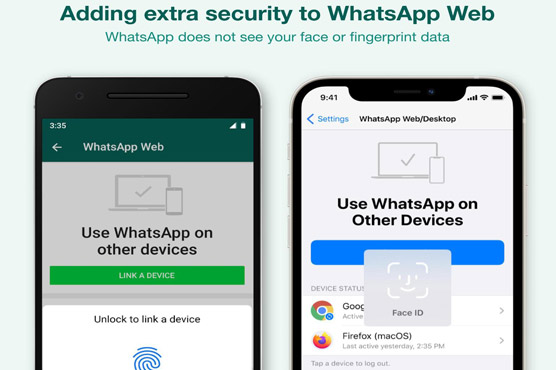WhatsApp announces additional security features for Web, Desktop

Users will now be asked to use face or fingerprint unlock on the phone.
(Web Desk) - WhatsApp has announced additional security features for WhatsApp Web and desktop, which it says will add another layer of protection to a user’s account when they link it to their computer.
WhatsApp will now take advantage of face or fingerprint unlock, where it is available on the mobile phone operating system when a user is linking it to the web version.
WhatsApp says that in order to link WhatsApp Web or Desktop to one’s account, they will now be asked to use face or fingerprint unlock on the phone, before scanning a QR code.
At the moment, users just have to scan the QR code from the phone to link their WhatsApp account to the laptop or PC.
According to the company, this new security feature will “limit the chance that a housemate or officemate can link devices” to their WhatsApp account without the user finding out.
Currently WhatsApp does notify users whenever Web/Desktop login occurs with a pop-up notification, but the new feature will add extra security. Users always have the ability to unlink devices from their phone at any time.
Also read: WhatsApp now uses Status updates to tackle privacy policy concerns
Earlier, WhatsApp has joined its own Status feature in an attempt to combat misinformation regarding the changes to their privacy policy.
WhatsApp will also use the feature to share information about changes to the app and upcoming features.
The Status update seems to be viewable by all users and includes a reminder of WhatsApp’s commitment to user privacy.
The update also included an announcement that WhatsApp will let users know about new features and application updates through its Status platform.
“WhatsApp is now on Status!” WhatsApp said. “We’ll let you about new features and updates here.”
“One thing that isn’t new is our commitment to your privacy.”
The company reminded users of the end-to-end encryption it offers, which means user conversations cannot be accessed by Facebook or WhatsApp.
“WhatsApp can’t read or listen to your personal conversations as they’re end-to-end encrypted,” WhatsApp said.
At the time of writing, there does not seem to be a way to opt-out of receiving WhatsApp Status updates.
This follows after the chat app’s new privacy update caused millions of WhatsApp users to abandon the service and head over to Telegram or Signal instead. Telegram gained approximately 90 million new users.
Signal gained around 50 million new users, with even Tesla CEO Elon Musk giving the service a shoutout on Twitter.
WhatsApp realised that they lost users’ trust, and are now aiming to repair the relationship.

